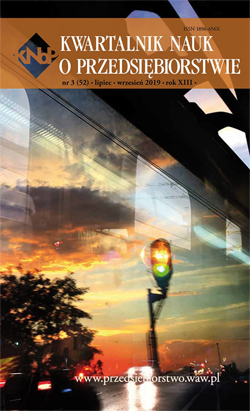Context-aware applications as the basis for value added creation (the case of the travel industry)
Main Article Content
Abstract
This paper seeks to focus on the idea of a user-centric context-aware digital system and its rationale in a process of tourism value creation. The purpose of the study is to offer an understanding of the context-aware applications in order to analyze their usefulness in tourism marketing. This is achieved through a literature review of existing research and the demonstration of several applications in travel and hospitality which might enrich the set of marketing tools adopted by tourism regions and enterprises.
Downloads
Article Details
The author of the article declares that the submitted article does not infringe the copyrights of third parties. The author agrees to subject the article to the review procedure and to make editorial changes. The author transfers, free of charge, to SGH Publishing House the author's economic rights to the work in the fields of exploitation listed in the Article 50 of the Act of 4 February 1994 on Copyright and Related Rights – provided that the work has been accepted for publication and published.
SGH Publishing House holds economic copyrights to all content of the journal. Placing the text of the article in a repository, on the author's home page or on any other page is allowed as long as it does not involve obtaining economic benefits, and the text will be provided with source information (including the title, year, number and internet address of the journal).
References
Bradley N., Dunlop M. (2004), Towards a User-centric and Multidisciplinary Framework for Designing Context-aware Applications, http://core.kmi.open.ac.uk/display/9015638, dostęp: 12.02.2019.
Bradley S. (2010), Designing for a Hierarchy of Needs, “Smashing Magazine”, https://bit.ly/2SZCLdE, dostęp: 5.02.2019.
Briscoe G., De Wilde P. (2006), Digital Ecosystems, in: Conference on Bio Inspired Models of Network, Information and Computing Systems, IEEE Press.
Carlsson C., Walden P. (2010), Supporting Tourists at the Bomarsund Fortress with a Mobile Value Service, “Journal of Information Technology Theory and Application”, Vol. 11(1), p. 43-56.
Cheverst K., Mitchell K., Davies N. (2002) Exploring context-aware information push, “Personal and Ubiquitous Computing”, Vol. 6(4), p. 81-276.
Christensen J., Sussman J., Levy S., Bennett E.B. (2006), Too much information, ACM Queue, July/August, p. 7-51.
Corrigan M., Miller H. (2011), Toward a user-centric digital ecosystem, “IT Pro”, July/August, p. 12-15.
Damiani E., Uden L, Trisnawaty Wangsa I. (2007) The future of E-learning: E-learning ecosystem, Inaugural Digital EcoSystems and Technologies Conference, 2007.
Dey A.K., Abowd G.D. (2000), Towards a better understanding of context, Technical Report GITGVU-99-22, http://dsv.su.se/fuse/int8/docs/context.pdf, dostęp: 15 Feb 2019.
Germanakos P. i in. (2008), Improving M-Commerce services Effectiveness, “Journal of Electronic Commerce in Organizations”, Vol. 69(1).
Grönroos C. (2008), Service logic revisited: Who creates value? And who co-creates?, “European Business Review”, Vol. 209(4), p. 298-314.
Grün C. i in. (2008), Assisting tourists on the move – an evaluation of mobile tourist guides, Proceedings of the 7th ICMB, Barcelona, July-8.
Kaasinen E. (2003), User needs for location-aware mobile services, “Personal and Ubiquitous Computing”, Vol. 7(1), p. 70-90.
Lau S.L. (2012), Towards a user centric context aware system, Kassel University Press.
Panayiotou C., Samaras G. (2004), Personalized portals for the wireless user, “Special Issue on Mobile and Pervasive Commerce”, Vol. 9(6).
Patterson P., Spreng R. (1997), Modelling the relationship between perceived value, satisfaction and repurchase intentions, “International Journal of Service Industry Management”, Vol. 8(5), p. 34-414.
Poslad S. i in. (2001), Creation of User-friendly Mobile services Personalised for Tourism, London, IEEE Press, p. 28-32.
Pospischil G., Umlauft M., Michlmayr E. (2002), Designing LoL@: A mobile tourist guide for UMTS, Mobile HCI, Springer.
Setten M., Pokraev S., Koolwaaij J. (2004), Context-aware recommendations in the mobile tourism application, Heidelberg, Springer.

